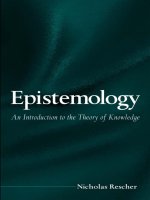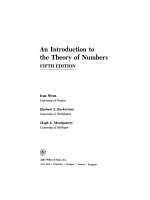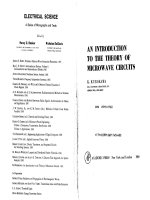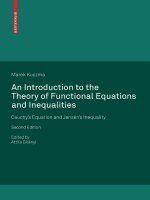0521842131 cambridge university press an introduction to the theory of knowledge mar 2007
Bạn đang xem bản rút gọn của tài liệu. Xem và tải ngay bản đầy đủ của tài liệu tại đây (1.02 MB, 244 trang )
This page intentionally left blank
An Introduction to the Theory of Knowledge
Epistemology, or the theory of knowledge, is one of the cornerstones of
analytic philosophy, and this book provides a clear and accessible
introduction to the subject. It discusses some of the main theories of
justification, including foundationalism, coherentism, reliabilism, and
virtue epistemology. Other topics include the Gettier problem, internalism
and externalism, skepticism, the problem of epistemic circularity, the
problem of the criterion, a priori knowledge, and naturalized epistemology.
Intended primarily for students taking a first class in epistemology, this
lucid and well-written text would also provide an excellent introduction
for anyone interested in knowing more about this important area of
philosophy.
noah lemos is Professor at the College of William and Mary. He is author of
Intrinsic Value (1994) and Common Sense (2004).
An Introduction to the Theory
of Knowledge
NOAH LEMOS
The College of William and Mary
CAMBRIDGE UNIVERSITY PRESS
Cambridge, New York, Melbourne, Madrid, Cape Town, Singapore, São Paulo
Cambridge University Press
The Edinburgh Building, Cambridge CB2 8RU, UK
Published in the United States of America by Cambridge University Press, New York
www.cambridge.org
Information on this title: www.cambridge.org/9780521842136
© Noah Lemos 2007
This publication is in copyright. Subject to statutory exception and to the provision of
relevant collective licensing agreements, no reproduction of any part may take place
without the written permission of Cambridge University Press.
First published in print format 2007
ISBN-13
ISBN-10
978-0-511-27118-2 eBook (Adobe Reader)
0-511-27118-2 eBook (Adobe Reader)
ISBN-13
ISBN-10
978-0-521-84213-6 hardback
0-521-84213-1 hardback
ISBN-13
ISBN-10
978-0-521-60309-6 paperback
0-521-60309-9 paperback
Cambridge University Press has no responsibility for the persistence or accuracy of urls
for external or third-party internet websites referred to in this publication, and does not
guarantee that any content on such websites is, or will remain, accurate or appropriate.
For my sons, Christopher and Adam
Contents
Preface
1 Knowledge, truth, and justification
page ix
1
2 The traditional analysis and the Gettier problem
22
3 Foundationalism
44
4 The coherence theory of justification
66
5 Reliabilism and virtue epistemology
85
6 Internalism, externalism, and epistemic circularity
108
7 Skepticism
131
8 The problem of the criterion
158
9 The a priori
179
10 Naturalized epistemology
201
Select bibliography
219
Index
227
vii
Preface
The theory of knowledge, or epistemology, is one of the main areas of
philosophy. Some of the problems are as old as Plato, yet they remain alive
and interesting today. This book is intended to introduce the reader to some
of the main problems in epistemology and to some proposed solutions. It is
primarily intended for students taking their first course in the theory of
knowledge, but it should also be useful to the generally educated reader
interested in learning something about epistemology. I do not assume that
the reader has an extensive background in philosophy.
In writing an introductory text, one must balance many things. I have
sought to strike a balance between impartial presentation and advocacy.
In general, I have tried to be fair and neutral between competing positions,
yet in some places I defend some views. I have also sought to hit the
mean between breadth and depth of coverage. I have not tried to cover every
important or recent position or to cover every development within the views
I discuss. I have tried to focus with clarity on some main features of a few
major positions. I hope this approach will be helpful to the reader seeking
an introduction to epistemology. I have tried to hit the mean, but as
Aristotle says, the mean rests with perception. I apologize for my blindspots.
In chapter 1, I distinguish between some senses of ‘‘knows’’ and note
that our primary focus will be on propositional knowledge. I introduce the
traditional view that propositional knowledge is justified true belief and
discuss in a general way the concepts of belief, truth, and justification.
In chapter 2, we consider some problems for this traditional view, problems
made prominent in a brief essay by Edmund Gettier. Much of chapter 2
is devoted to considering some simple ways of analyzing or defining
knowledge that avoid the problems to which Gettier calls our attention.
Unfortunately, none of these are successful, but they represent some basic
attempts upon which others have tried to improve. In chapters 3, 4, and 5,
ix
x
Preface
we explore some views about what makes beliefs justified. In these chapters
we will look at versions of foundationalism, coherentism, reliabilism, and
virtue epistemology. I have tried not to discuss every version or nuance of
these views. Most likely, too much detail would overwhelm the reader and
prevent one from understanding the main points of the theory. In chapter 6,
I discuss briefly the debate between internalism and externalism about
justification before turning to the problem of epistemic circularity. The
problem of epistemic circularity arises when we consider how we can know
that our ways of forming beliefs are reliable. Can one use a way of forming
beliefs to support the belief that that way of forming beliefs is reliable?
Can one use memory, for example, to support the belief that memory is
a reliable way of forming beliefs? Chapter 7 addresses the problem of
skepticism. We consider several skeptical arguments and consider some
main responses to them. These include the Moorean response, the relevant
alternatives response, the contextualist response, and the inference to the
best explanation response. In chapter 8, we turn to the problem of the
criterion. We focus on Roderick Chisholm’s formulation of the problem and
his favored position, ‘‘particularism.’’ Throughout much of this book we will
appeal to particular examples of knowledge and justification in assessing
criteria of knowledge and justification. Is this an epistemically unsatisfactory procedure? In chapter 9, we will explore some views about a priori
knowledge and justification and consider whether our a priori knowledge
and justification is confined to what is ‘‘analytic.’’ Chapter 10 concludes
with a brief discussion of some central themes in naturalistic epistemology.
Again, I have tried to balance breadth with depth and always with an eye
to providing a clear and useful introduction to epistemology. I would
recommend that anyone seriously interested in studying the subject read
this book in conjunction with a good anthology of contemporary essays in
the field. In that way the reader will be exposed to more sophisticated and
detailed versions of the views considered here.
I wish to thank Hilary Gaskin of Cambridge University Press for her
support and patience. I wish to thank several people who read and commented on parts of the manuscript: Erik Wielenberg, Girrard Brenneman,
Luke M. Davis, and most especially James Beebe. I wish to thank my wife,
Lisa, for her patience and for putting so much on hold while I completed
this project. I also thank her for my sons, Christopher and Adam, to whom
this book is dedicated.
1
Knowledge, truth, and justification
Epistemology, or the theory of knowledge, is concerned with a variety of
questions about knowledge and related topics. Certainly one of the most
important questions is ‘‘What is the extent of our knowledge?’’ Some
philosophers, especially those in the ‘‘common sense’’ tradition, would say
that we know pretty much those things that we ordinarily think we know.
They would tell us, for example, that we know that there are other people,
that they think and feel, that we were alive yesterday, that there are cars
and dogs, and so on. They would tell us that we know a lot about our
immediate physical surroundings, other people, and the past. Others would
add that we know various ethical and moral truths and some would also
say that they know various truths about God and God’s attitude toward
mankind. Still other philosophers, influenced by various forms of skepticism, would say that we know much less than any of this, and the most
extreme skeptics would say that we really know nothing at all.
Evaluating these views is no easy matter, and when we reflect on them,
and the reasons advanced in favor of them, we are soon led to other
questions about knowledge. Such reflection might naturally lead us to ask
one of the most important and oldest epistemological questions, ‘‘What is
knowledge?’’ Over two millennia ago, Plato wrestled with it in his dialogue,
Theaetetus. Plato sought a definition of knowledge, but came to no clear
answer and the dialogue ended inconclusively.
The primary aim of this chapter is to introduce the traditional account
of propositional knowledge as epistemically justified true belief. In the
first section, propositional knowledge will be distinguished from other
sorts of knowledge. In the second section, the traditional account of
knowledge will be introduced. Next, I shall make some general remarks
about the main components of the traditional account, about belief, truth,
1
2
An Introduction to the Theory of Knowledge
and epistemic justification. Finally, I will make some general comments
about justification and evidence, and introduce the concept of evidential
defeat.
Three senses of ‘‘knows’’
In ordinary language when we say that someone knows something, we can
mean different things by ‘‘knows.’’ There are different senses of ‘‘knowledge’’ or, we may say, different kinds of knowledge. Among the three most
significant are (1) propositional knowledge, (2) acquaintance knowledge,
and (3) ‘‘how to’’ knowledge. Let us begin with propositional knowledge.
Propositional knowledge is knowledge of facts or true propositions. So,
consider the following examples of propositional knowledge:
(1) John knows that Caesar was assassinated.
(2) John knows that the sky is blue.
In these examples, the objects of knowledge, or what is known, are,
respectively, the true propositions that Caesar was assassinated and that the
sky is blue.
It is important to distinguish between sentences and propositions.
Consider two people, Paul and Pierre. Let’s suppose that each believes that
the sky is blue. Paul, however, speaks only English and Pierre speaks only
French. In expressing his belief, Paul would say, ‘‘The sky is blue,’’ and Pierre
would say, ‘‘Le ciel est bleu.’’ Though each expresses his belief by a different
sentence, each believes the same proposition. Similarly, since each knows
that the sky is blue, each knows the same proposition.
We may think of belief as a relation between a subject and a proposition.
If the proposition one believes is true, then one’s belief is true and if the
proposition one believes is false, then one’s belief is false. We may also
think of propositional knowledge as a relation between a subject and
a proposition. More precisely, propositional knowledge is a relation between
a subject and a true proposition.
Propositional knowledge is not the only sort of knowledge. Suppose, for
example, someone made the following claims:
(3) John knows the President of the United States.
(4) John knows the Pope.
Knowledge, truth, and justification
We might naturally take these claims to imply that John is acquainted with
the President of the United States and that he is acquainted with the Pope.
We might naturally take (3) and (4) to imply that John has met them. If we do
take (3) and (4) in this way, then we are attributing acquaintance knowledge
to John. To say that John has acquaintance knowledge of someone is to
imply that he is acquainted with him or that he has met him.
Acquaintance knowledge needs to be distinguished from propositional
knowledge. Obviously, one can have a great deal of propositional knowledge
about someone without having acquaintance knowledge of him. I might
have, for example, a great deal of propositional knowledge about the
President. I might know that he was born on such and such a date and that
he attended such and such a university. I might know a great many similar
true propositions about him. But though I might have a great deal of
propositional knowledge about the President, it would not follow that I have
acquaintance knowledge of him since I am not acquainted with him and
have not met him.
In ordinary language, when we say ‘‘A knows B,’’ we are sometimes using
‘‘know’’ in the propositional sense and sometimes in the acquaintance
sense. Suppose, for example, a detective says grimly, ‘‘I know this killer. He’ll
strike againÀand soon.’’ Our detective need not be taken to mean that he
has actually met the killer or that he is acquainted with him. He might
mean simply that he knows that the killer is the sort that will soon strike
again. He has a certain sort of propositional knowledge about the killer.
Similarly, if I am impressed with John’s vast knowledge about Caesar,
I might say, ‘‘John really knows Caesar.’’ Clearly, I am implying that John
has a lot of propositional knowledge about Caesar and not that John has
met him.
One can have acquaintance knowledge of things other than people. One
can have, for example, acquaintance knowledge of Paris or the taste of
a mango. If one has such knowledge of Paris, then one has been there and
if one has such knowledge of the taste of a mango, then one has tasted
a mango. Again, we need to distinguish knowledge of this sort from
propositional knowledge. One might have much in the way of propositional
knowledge about Paris, knowing what the main boulevards are, when
the city was founded, knowing where various landmarks are, without
having the sort of acquaintance knowledge that implies actually having
been there.
3
4
An Introduction to the Theory of Knowledge
In addition to propositional knowledge and acquaintance knowledge,
let us consider ‘‘how to’’ knowledge. Sometimes when we say, ‘‘A knows how
to X,’’ we mean or imply that A has the ability to X. In other cases, however,
when we say that ‘‘A knows how to X’’ we do not mean or imply that A has
the ability to X. There is, then, one sense of ‘‘knowing how to X’’ which
implies that one has the ability to X and another sense that doesn’t.
According to the first sense of ‘‘knowing how,’’
(5) John knows how to play a piano sonata
implies
(6) John has the ability to play a piano sonata.
But, again, there is another sense of knowing how to X that does not imply
that one has the ability to X. To appreciate this second sense suppose that
John is a talented violinist who reads music well, but can’t play the piano
at all. Imagine that he has a lot of knowledge about how to play a particular
piano sonata. He might know, for example, that the right index finger
should play this note and the right thumb should play that note, and so
forth. Indeed, John might be able to describe precisely how to play the
piece, even though he cannot play it himself. In this case, we may say
that John knows how to play the sonata, even though he does not have
the ability to play. In this sense of ‘‘knowing how,’’ (5) does not imply (6).
There is, then, a sense of ‘‘knowing how’’ to do something which is simply
a matter of having propositional knowledge about how to do it. John
the violinist, for example, has a great deal propositional knowledge about
how to play a piano sonata. But in another sense of ‘‘knowing how,’’
he does not know how to play a piano sonata because he lacks the ability
to do so.
As the previous case illustrates, one can have a lot of propositional
knowledge about how to do something without having the ability to do it.
Conversely, one can have the ability to do something without having much
propositional knowledge about it. To see this, imagine a physiologist who
has a lot of propositional knowledge about how to walk. He has studied how
one needs to transfer weight from one foot to another, how the knees
should bend, how the foot should bend, what muscles are involved, etc. Our
expert might have a great deal of propositional knowledge about walking.
But now consider young Mary. Mary is ten months old and has just learned
Knowledge, truth, and justification
to walk. She knows how to walk, but we can easily imagine that she lacks
the propositional knowledge about how to walk enjoyed by the expert.
Mary’s propositional knowledge about how to walk is probably quite
meager, if, indeed, she has any at all.
We have distinguished propositional knowledge from both acquaintance
knowledge and knowing how to do something. Traditionally, philosophers
have been most concerned with propositional knowledge. One reason for
this is that philosophers are typically concerned with what is true. They
want to know what is true and they want to evaluate and assess their own
claims, and those of others, to know the truth. When philosophers ask, for
example, about the extent of our knowledge, they are typically concerned
with the extent of our propositional knowledge, with the extent of the
truths that we know. When one philosopher says he knows that there are
external objects and another philosopher denies this, they are disagreeing
about whether there is propositional knowledge of a certain sort. They
are disagreeing about whether truths of a certain kind are known.
Acquaintance knowledge and ‘‘how to’’ knowledge are not in the same
way ‘‘truth focused.’’ So let us consider the concept of propositional
knowledge more closely.
Propositional knowledge and justified true belief
We noted at the beginning of this chapter that the question, ‘‘What is
knowledge?’’, is an ancient one. Since our focus is on propositional knowledge, we might ask, ‘‘What is it for someone to have propositional knowledge?’’ Alternatively we might ask, ‘‘What is it for a subject, S, to know that
p (where p is some proposition)?’’
According to one traditional view, to have propositional knowledge
that p is to have epistemically justified true belief that p. Before we consider
this traditional view, let us begin by considering the following clearly
mistaken view:
D1
S knows that p ¼ Df. S believes that p.
According to D1, believing something is sufficient for knowing it. If D1
were true, then someone who believed a false proposition would know it.
If a child, for example, believed that 2 þ 3 ¼ 6, then, according to D1 the
5
6
An Introduction to the Theory of Knowledge
child would know that 2 þ 3 ¼ 6. But the child does not know that. So, D1
is false.
Now, admittedly, people do sometimes say that they know things that are
false. For example, a football fan might be utterly convinced that his team
will win the championship. After his team loses, he might say, ‘‘I just knew
they would win. Too bad they didn’t.’’ But our fan did not know that his
team would win. He was simply confident or convinced that they would.
His claim to know is perhaps best understood as a bit of hyperbole, as when
one says, ‘‘I am just dying of hunger’’ or ‘‘I’d just kill for a cigarette.’’ Such
claims are, usually, not to be taken literally. Strictly speaking, what our fan
says is false.
Mere belief, then, is not sufficient for knowledge. Knowledge requires
that one’s belief be true. So, let us consider the following view:
D2
S knows that p ¼ Df. (1) S believes that p and (2) p is true.
D2 tells us that one knows that p if and only if one has a true belief
that p. D2 says that having a true belief that p is sufficient for one’s knowing
that p. But this, too, is clearly mistaken. One might have a true belief that
is not knowledge. True beliefs that are mere lucky guesses or mere hunches
or based on wild superstitions are not instances of knowledge. Suppose,
for example, Bonnie reads her horoscope in the newspaper. It says that she
will soon come into money. Bonnie has no evidence to believe that this is
true, still she believes what her horoscope says. Later that day she finds fifty
dollars in the pocket of her old coat. Bonnie’s belief that she would come
into money was true, but it was not knowledge. It was a true belief based on
no evidence. Consider also Malcomb, an extreme pessimist. Every morning
he forms the belief that something really bad will happen to him today.
Every morning he forms this belief, though he has no reasons or evidence
for it and the belief is almost always false. One afternoon he is hit by a bus
and killed. On that morning, Malcomb’s belief that something really bad
would happen to him turned out to be true. But it is false that Malcomb
knew that something really bad was going to happen to him. His belief,
though true, was not an instance of knowledge. Since D2 takes mere true
belief to be sufficient for knowledge, it implies incorrectly that Bonnie and
Malcomb have knowledge.
If mere true belief is not sufficient for knowledge, then what else is
needed? One traditional answer is that S knows that p only if p is epistemically
Knowledge, truth, and justification
justified for S or p is reasonable for S to believe. We may formulate this
traditional account this way:
S knows that p ¼ Df. (1) S believes that p, (2) p is true, and (3) p
D3
is epistemically justified for S.
According to D3, knowledge requires epistemically justified true belief.
So, let’s say that D3 represents a JTB account of knowledge.1
As we have seen, D2 implies incorrectly that Bonnie knows that she will
come into money and Malcomb knows that something really bad will
happen to him today. But D3 need not be taken to have that flaw. To see why
consider Bonnie again. She believes that she will come into money. She
believes this because she read it in the newspaper’s horoscope and she has
no other evidence for believing it. Under these circumstances, the proposition that she will come into money is not one that is justified or
reasonable for her. Bonnie’s belief does not meet the justification condition
in D3. So, D3 does not imply that Bonnie knows. Similar considerations
apply to Malcomb’s case. The proposition that something really bad will
happen to him today is not justified or reasonable for him. He simply
accepts it on the basis of an exaggerated pessimism. So, D3 does not imply
that Malcomb knows. D3 seems in this respect to be an advance over D2.
D3 seems to be on the right track. In the next chapter, however, we shall
consider some serious objections to D3 and the need to add yet further
conditions. Still, while almost all philosophers agree that D3 is not adequate
as it stands, many agree that knowledge does require epistemically justified
true belief. For the moment then, let us turn to consider briefly these
components of propositional knowledge. I shall make some general comments about each in the hope that we might get a better understanding of
the traditional view about knowledge.
Belief
Whenever we consider a proposition, there are three different attitudes we
can take toward it. First, we can believe it or accept it as true. Second, we can
1
Versions of a JTB account of knowledge were held at one time by Roderick M. Chisholm
and A. J. Ayer. See Roderick Chisholm, Perceiving: A Philosophical Study (Ithaca: Cornell
University Press, 1957), p. 16 and A. J. Ayer, The Problem of Knowledge (New York:
St. Martin’s Press, Inc., 1955), pp. 31À35.
7
8
An Introduction to the Theory of Knowledge
disbelieve it, i.e. believe that it is false or believe its negation. Third, we can
withhold belief in it or suspend judgment. We may illustrate these attitudes
by reflecting on the attitudes of the theist, the atheist, and the agnostic
toward the proposition that God exists. The theist accepts the proposition,
the atheist disbelieves it, and the agnostic withholds belief in it.
As we noted earlier, we may think of belief as a propositional attitude, as a
relation between a subject and a proposition. There are, of course, many
propositional attitudes in addition to belief. Hope, fear, doubt, and desire
are just some ways in which one may be related to a proposition. Consider
the proposition that it will rain. In addition to believing that it will rain, one
can hope, fear, doubt, or desire that it will rain.
Believing a proposition needs to be distinguished from other propositional attitudes such as entertaining and considering a proposition. To
entertain a proposition is merely to ‘‘hold it before the mind.’’ To consider
a proposition is to entertain it and to study or examine it. One can entertain
or consider a proposition without believing it. I can now, for example,
entertain and consider the proposition that the earth is a cube without
believing it. One can also believe something without entertaining or
considering it. This morning, for example, I believed that the earth was
round, but I did not entertain or consider that proposition.
We all believe a great many things that we are not entertaining or
considering. These beliefs are said to be dispositional beliefs. My belief this
morning that the earth is round was a dispositional belief. When we believe
some proposition that we are entertaining, then our belief is said to be an
occurrent belief. Since I am now entertaining the proposition that the earth is
round, my belief that the earth is round is an occurrent belief.
Having a dispositional belief needs to be distinguished from a disposition
to believe something. There are many propositions that we do not now
believe, but are such that we would believe them if we considered them.
Someone might never have considered the proposition that no elephant is
a neurosurgeon and might not believe that proposition. Still, he might be
such that he would believe that proposition if he considered it. He would
have a disposition to believe that proposition, even if he did not have a
dispositional belief in it.
Let’s conclude this brief discussion by making two points. First, according
to the traditional JTB account of knowledge, knowledge that p requires that
one believe that p. We may say that knowledge requires either occurrent or
Knowledge, truth, and justification
dispositional belief. Thus, we can say I knew this morning that the earth was
round even though my belief in that proposition was dispositional. Second,
belief ranges in intensity or strength from complete and firm conviction to
tentative and cautious acceptance. Thus, one might be firmly and strongly
convinced that God exists or one might accept it with some weaker degree
of conviction. Now, if knowledge requires belief and belief comes in varying
degrees of intensity, is there some degree of intensity of belief that is
required for knowledge? According to the traditional view, knowledge
simply requires justified true belief. As long as one believes that p and the
other conditions are met, then one knows that p whatever the intensity of
one’s belief.
Truth
There are many theories about the nature of truth and about what makes
a proposition or a belief true or false. One of the oldest and perhaps
most widely held is the correspondence theory of truth. The correspondence
theory makes two main claims. First, a proposition is true if and only if it
corresponds to the facts. Second, a proposition is false if and only if it fails to
correspond to the facts. Advocates of the correspondence theory often add a
third claim, that the truth of a proposition or belief is dependent on the facts
or upon the way the world is. Such a view is suggested by Aristotle, who
wrote, ‘‘It is not because we think truly that you are pale, that you are pale;
but because you are pale we who say this have the truth.’’2 The proposition
that you are pale is true because you are pale. The proposition that you are
pale is true because of, or in virtue of the fact that you are pale.
According to the correspondence theory of truth, a proposition is not
true because of what we believe about it. The truth of the proposition that
someone is pale, for example, does not depend on our believing it or on
what we believe about it. The proposition is true if and only if someone is
pale. It is true, as Aristotle notes, because of the fact that someone is pale.
Moreover, according to the correspondence theory, one and the same
proposition cannot be both true and false. The proposition that you
are pale cannot be both true and false. Neither can the proposition be
2
Aristotle, Metaphysics, bk. IX, ch. 9, 1051b, trans. W. D. Ross, in The Basic Works of Aristotle,
ed. Richard McKeon (New York: Random House, 1941), p. 833.
9
10
An Introduction to the Theory of Knowledge
‘‘true for you and false for me.’’ The truth is not ‘‘relative’’ in this way.
Of course, you might believe some proposition that I reject. We might thus
disagree about the truth of some proposition. Still, the truth of the
proposition is determined by the facts and not by whether you or I believe it.
Again, suppose that some ancient culture believed that the earth was a disk
floating in an endless sea. Should we say that this proposition was true
‘‘for them’’? According to the correspondence theory, the answer is ‘‘no.’’
They accepted the proposition. They believed it was true. But the proposition
they believed was false. It did not correspond to the facts.
Still, let us consider the following objection. ‘‘Suppose that Jim is in
London talking to his brother, Tom, in New York. Jim looks out his window,
sees the rain falling and says, ‘It is raining.’ Tom looks out his window, sees
the sun shining and says, ‘It is not raining.’ Couldn’t they both be right?
Isn’t this a case where a proposition is both true and false?’’ Of course, they
could both be right. In fact, given our description of the case, each of them is
right. But this does not show that one and the same proposition is both true
and false. We should say that the proposition that Jim accepts is that it is
raining in London, and the proposition that Tom accepts is that it is not
raining in New York. Each of them accepts a true proposition. But they do
not accept the same proposition.
The correspondence theory of truth is old and widely held. There are,
however, objections to theory. Some object that unless we have some
explanation of what it is for a proposition to correspond with the facts, the
theory is not very informative. Others object that the theory is uninformative because the notion of a fact is obscure. Yet others would say that
one cannot explain what a fact is without making use of the concepts of
truth and falsity, and, therefore, the correspondence theory is circular and
ultimately unenlightening.
These are important criticisms. Unfortunately, to assess these objections
adequately would simply take us too far afield. Still, the basic intuition that
the truth of a proposition depends upon the facts has proved stubbornly
resistant to criticism. I shall be assuming throughout this book that some
version of the correspondence theory of truth is correct. It is worth noting,
though, that there are other theories of truth. Let us consider briefly two of
them.
One alternative to the correspondence theory is the pragmatic theory of
truth. A central insight of the pragmatic theory is that true beliefs are
Knowledge, truth, and justification
generally useful and false beliefs are not. If a doctor wants to cure a patient,
it is useful for the doctor to have true beliefs about what will cure the
patient. If a man wants to go to Boston, true beliefs about which road to take
are generally more useful than false beliefs. Noting this connection, the
pragmatic theory tells us that a proposition is true if and only if believing
it or acting on it is, or would be, useful (in the long run). Roughly, a belief
is true if and only if it is useful or expedient. William James, the great
American pragmatist, wrote, ‘‘The true is only the expedient in the way of
our behaving, expedient in almost any fashion, and expedient in the long
run and on the whole course.’’3
Suppose that true beliefs generally provide a good basis for action, that
they are generally useful and that false beliefs are generally a bad basis
for action. Critics of the pragmatic theory note that even if this is so, it
would not follow that we should identify true belief with useful belief.
Sometimes a true belief might have very bad consequences and a false belief
might have very good ones. Suppose for example the following proposition
is true:
(7) Tom will die in old age from a long and painful illness.
Suppose further that if Tom were to believe this, he would be quite
distraught. The joy that he now finds in life would be greatly diminished. He
would be haunted by the specter of his painful death. Let us suppose that it
is not useful for Tom to believe (7). Still, since (7) is true, it seems we should
reject the view that a proposition is true if and only if believing it or acting
on it would be useful. Similarly, there could be false propositions that are
useful to believe or act on. Imagine, for example, that when Tom is old and
suffering from his painful and fatal illness, he consoles himself with the
belief that:
(8) Others in the hospital are suffering more than I am and doing so with
courage.
Believing (8) helps Tom face his own suffering calmly and with courage. He
thinks that since others are courageously facing suffering greater than his,
then at least he can do the same. Believing (8) is very useful for Tom.
But suppose (8) is false. Suppose no one in the hospital is suffering worse
3
William James, Essays in Pragmatism (New York: Hafner Publishing Co., 1948), p. 170.
11
12
An Introduction to the Theory of Knowledge
than Tom. Again, it seems that what is useful to believe is not always true,
and what is true is not always useful to believe.
Another theory of truth is the coherence theory of truth. Not surprisingly, the
concept of coherence is central to the theory. We shall say more about
coherence in chapter 4. For the moment, let us consider the following
example that we may take to illustrate the concept. Suppose that I believe
the following propositions: (i) I have the sense experience of something
white in my hand, (ii) I have the experience of something round in my hand,
(iii) I have the experience of something cold in my hand. The proposition,
(iv) there is a snowball in my hand, coheres with (i)À(iii). It would seem that
(iv) better coheres with (i)À(iii) than some other propositions, e.g. that I have
a hot lump of coal in my hand.
Some philosophers take the fact that a proposition coheres or ‘‘hangs
together’’ with other propositions one believes to be indicative of its truth
or a good reason to believe it’s true. In other words, they treat coherence as
a source of justification. So, for example, if one believes (i)À(iii), then, other
things being equal, it is more reasonable to believe (iv) than that one has
a hot lump of coal in one’s hand because of (iv)’s greater coherence with
(i)À(iii). Proponents of the coherence theory of truth, however, treat
coherence not merely as a source of justification; they take coherence to
be a condition of truth. They hold that for a proposition to be true is nothing
more than a matter of its coherence with other propositions. Brand
Blanshard, a defender of the coherence theory of truth, wrote ‘‘Assume
coherence as the test [of truth], and you will be driven by the incoherence of
your alternatives to the conclusion that it is also the nature of truth.’’4
Critics of the coherence theory of truth raise a variety of objections.
First, they note that the concept of ‘‘coherence’’ is murky. Indeed, some
critics claim that the concept of coherence is at least as much in need of
explanation as those of ‘‘correspondence’’ and ‘‘fact.’’ They would say that
the coherence theory has no real advantage in clarity over the correspondence theory. Second, they note that we cannot say simply that a
proposition is true if and only if it belongs to a coherent set of propositions.
A very realistic piece of fiction might be a coherent set of false propositions.
Moreover, the fact that (iv) above coheres with other propositions that
I believe such as (i)À(iii) does not guarantee that (iv) is true. I might believe
4
Brand Blanshard, The Nature of Thought, vol. 2 (New York: Macmillan, 1940), p. 269.
Knowledge, truth, and justification
(i)À(iv) and be merely having an hallucination of a snowball or merely
dreaming that I am holding a snowball. Indeed, Descartes raised the
possibility of massive deception by an evil demon, deception so massive that
most of our sensory experience of the world is illusory. In such a scenario,
our beliefs about the world around us would be almost entirely false. Still,
they might be quite coherent. In fact, our beliefs might enjoy as much
coherence in such a scenario as they do right now. But again, they would
be false. Finally, critics argue that we should not confuse a criterion of
justification with a condition of truth and we should not assume that
because we have a criterion of justification we have ipso facto a condition of
truth. Even if coherence turns out to be a source of justification, it does not
follow that it is what makes a proposition true.
Epistemic justification
According to the traditional JTB account, knowledge that p requires that one
be epistemically justified in believing that p. Much of this book will be
concerned with the topic of epistemic justification. Indeed, much of recent
epistemology has focused on this topic. For the moment, we may make the
following general points.
First, the kind of justification knowledge requires is epistemic justification. We must note that there are kinds of justification that are not
epistemic. For example, the batter who steps up to the plate might be more
likely to get a hit if he believes that he will. Of course, he will probably not
get a hit. Even for the best batters the odds of doing so are poor. Still,
believing that he will succeed and having a positive attitude will help him.
So, we may grant that he has a practical justification for his belief even
if he has no epistemic justification for it. Again, consider someone facing a
life threatening illness, one from which most people do not recover. Even
though the evidence is against his recovery, a belief that one will recover
might improve one’s chances. In such a case, one might have a moral or
prudential justification for believing that one will recover even if one has
no epistemic justification for it. Unlike prudential or moral justification,
epistemic justification seems to be tied in an important way to truth,
though it is hard to say in exactly what way it is connected with truth.
Perhaps we might say that epistemic justification aims at truth in a way that
prudential and moral justification do not. Perhaps we might say that if one
13


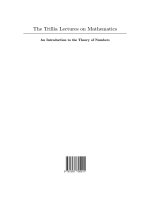
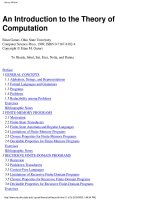
![an introduction to the theory of surreal numbers [electronic resource]](https://media.store123doc.com/images/document/14/y/pg/medium_pgk1401470100.jpg)
